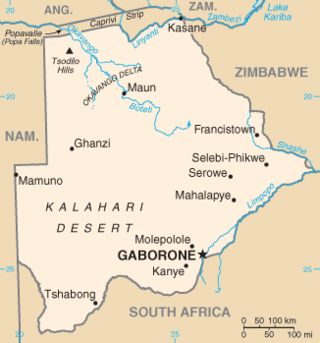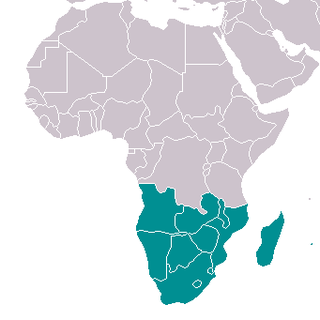
Rhodesia, officially from 1970 the Republic of Rhodesia, was an unrecognised state in Southern Africa from 1965 to 1979. During this fourteen-year period, Rhodesia served as the de facto successor state to the British colony of Southern Rhodesia, and in 1980 it became modern day Zimbabwe.

The Internal Settlement was an agreement which was signed on 3 March 1978 between Prime Minister of Rhodesia Ian Smith and the moderate African nationalist leaders comprising Bishop Abel Muzorewa, Ndabaningi Sithole and Senator Chief Jeremiah Chirau. After almost 15 years of the Rhodesian Bush War, and under pressure from the sanctions placed on Rhodesia by the international community, and political pressure from South Africa, the United Kingdom, and the United States, the Rhodesian government met with some of the internally based moderate African nationalist leaders in order to reach an agreement on the political future for the country.
United Nations Security Council Resolution 216 was adopted by the United Nations Security Council on 12 November 1965, the day after the British Dependency of Southern Rhodesia's Unilateral Declaration of Independence from the British Empire as the state of Rhodesia. The vote was ten to none, with one member, France, abstaining.

United Nations Security Council Resolution 232 was adopted by the United Nations Security Council on December 16, 1966.
United Nations Security Council Resolution 253, adopted unanimously on May 29, 1968, after reaffirming previous resolutions, the Council noted with concern that the measures taken so far have failed to bring the rebellion in Southern Rhodesia to an end and condemned the recent "inhuman executions carried out by the illegal regime in Southern Rhodesia which have flagrantly affronted the conscience of mankind". After further condemning the regime and calling upon the United Kingdom to end the rebellion in Southern Rhodesia the Council decided that all member states would:
United Nations Security Council Resolution 290, adopted on December 8, 1970, after more invasions of the territory of the Republic of Guinea by naval and military units of Portugal on November 22/23 and 27/28, the Council reaffirmed its numerous previous resolutions on the topic, including the right of the peoples of Angola, Mozambique and Portuguese Guinea to be freed from the Portuguese Empire ruled by the Estado Novo regime. The Council endorsed the conclusions of the report by the Special Mission to the Republic of Guinea, strongly condemned the Portuguese Government, demanded that full compensation be paid to the Republic and declared that Portuguese colonialism was a serious threat to the peace and security of Africa.
United Nations Security Council Resolution 327, adopted on February 2, 1973, reaffirmed previous resolutions on the topic of Rhodesia and commended Zambia for its decision to immediately enforce sanctions. The United Nations plan to crush the Rhodesian government relied heavily on sanctions, Zambia had decided to enforce the sanctions when other nations chose not to despite the large impact the cessation of trade with Rhodesia would have on the Zambian economy. The Council decided to send the special mission established by resolution 326 to assess the needs of Zambia in maintaining alternate forms of communication and traffic, as most of it had flowed through Rhodesia in the past.
United Nations Security Council Resolution 333, adopted on May 22, 1973, after reiterating previous statements and admitting that previous measures had yet failed to bring about the end of the "illegal regime in Southern Rhodesia" the Council condemned South Africa and Portugal for failing to co-operate with the implementation of sanctions and requested that urgent action be taken to implement them. The Council then requested that states with legislation permitting importation from Rhodesia repeal it immediately and called upon states to enact and enforce legislation against any person who tries to evade of commit a breach of sanctions by:
United Nations Security Council Resolution 386, adopted unanimously on March 17, 1976, noted statements made by the President and Minister for Foreign Affairs of the People's Republic of Mozambique and also expressed its concern regarding the situation created by the provocative, aggressive acts committed by the illegal minority regime in Rhodesia. The Council reaffirmed their earlier work regarding Rhodesia, including their resolutions imposing sanctions on that country and noted their appreciation with Mozambique's co-operation with that plan. The Resolution then condemns Rhodesia's aggressive acts, including military incursions, against Mozambique and noted the urgent and special economic need of Mozambique who arose from its implementation of resolution 253.
United Nations Security Council Resolution 388, adopted unanimously on April 6, 1976, reaffirmed previous resolutions on the topic, including the conclusion that the situation in Rhodesia constituted a threat to international peace and security. The council decided to expand its sanctions regime to include;
United Nations Security Council Resolution 409, adopted on May 27, 1977, reaffirmed the Council's previous resolutions and affirmed that the policies created by them would remain in place. The Council, acting under Chapter VII, further decided that all member states should prohibit the use of funds in their territory from use by Rhodesia and/or Rhodesian citizens, save for pensions. The Resolution also decided that the Committee established in Resolution 253 (1968) should examine possible uses of Article 41 of the Charter of the United Nations.

United Nations Security Council Resolution 403, adopted on January 14, 1977, after hearing representations from the Minister of External Affairs of Botswana, condemned attacks by the "illegal minority regime" in Southern Rhodesia. The resolution recalled previous resolutions on the topic, including the right to self-determination of the people of Southern Rhodesia.
United Nations Security Council Resolution 411, adopted unanimously on June 30, 1977, noted statements made by officials of the People's Republic of Mozambique and also expressed its concern regarding the situation created by the provocative, aggressive acts committed by the illegal minority regime in Rhodesia. The Council reaffirmed their earlier work regarding Rhodesia, including their resolutions imposing sanctions on that country and noted their appreciation with Mozambique's co-operation with that plan. The Resolution then condemns Rhodesia's aggressive acts, including military incursions, against Mozambique and noted the urgent and special economic need of Mozambique who arose from its implementation of resolution 253.

In United Nations Security Council Resolution 423, adopted on March 14, 1978, after recalling its resolutions on Southern Rhodesia, particularly 415 (1977), the Council condemned attempts by the "illegal racist regime" in Southern Rhodesia to retain power and prevent the independence of Zimbabwe. It also criticised the country's executions of political prisoners and actions against neighbouring countries.

United Nations Security Council Resolution 424 was adopted unanimously on March 17, 1978; after hearing representations from Zambia, the Council expressed concern at unprovoked attacks against the country by the "illegal racist regime" in Southern Rhodesia, which resulted in deaths and destruction of property in Zambia. The Rhodesian Security Forces maintained that they had been attacking guerrilla bases in the country.

United Nations Security Council Resolution 437, adopted on October 10, 1978, recalled Resolution 253 (1968), which prohibited Member States from allowing individuals connected to the regime in Southern Rhodesia to enter their territory. The Council noted with regret that the United States had allowed Ian Smith and other members of the "illegal regime" to enter the country, considering this action a violation of Resolution 253.

United Nations Security Council resolution 455, adopted on 23 November 1979, after taking note of representations from Zambia and recalling Resolution 424 (1978), the Council expressed concern and condemned the "illegal racist regime" in Southern Rhodesia for its "sustained pattern of violations aimed at destroying the economic infrastructure" of Zambia and causing a number of deaths.

United Nations Security Council resolution 577, adopted unanimously on 6 December 1985, after reaffirming Resolution 571 (1985), the Council endorsed a report by the Security Council Commission of Investigation, condemning the regime in South Africa for its continued and unprovoked attacks against the People's Republic of Angola through the occupied territory of South West Africa.

United Nations Security Council resolution 1221, adopted unanimously on 12 January 1999, after reaffirming Resolution 696 (1991) and all subsequent resolutions on Angola, particularly resolutions 1196 (1998) and 1219 (1998), the Council condemned the downing of two commercial planes over UNITA-controlled territory in Angola and demanded that UNITA leader Jonas Savimbi co-operate in the search for survivors of the recent plane crashes.

United Nations Security Council resolution 1306, adopted on 5 July 2000, after recalling all previous resolutions on the situation in Sierra Leone, particularly resolutions 1132 (1997), 1171 (1998) and 1299 (2000), the Council decided to prohibit the direct or indirect import of rough diamonds from the country. The rebel Revolutionary United Front controlled 90% of the diamond-producing areas in Sierra Leone and was using diamonds to finance its operations.









